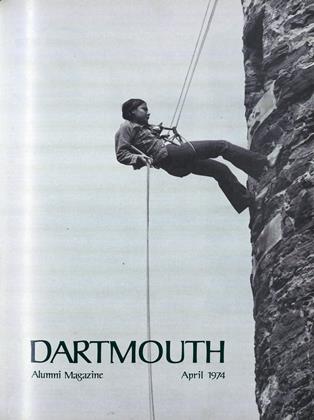By Edward M. Holmes '33. Orono (Maine):Puckerbrush Press, 1972. Paper Bound.69 pp. $2.25.
Clearly Edward Holmes is a man who loves his work. And it is the most satisfying work one could imagine: he writes "Maine Stories." In this slim book he has collected a baker's dozen of them ranging from a fully developed short story ("Hard Times Aboard the Boreas"), through less formal - but never formless pieces which have appeared in Yankee, to more or less casual sketches done for Sunday newspaper supplements.
The sub-title Maine Stories, consistent with Holmes' penchant for Down East understatement, may lead to serious ambiguity. Stories about Maine these certainly are, but "Maine Stories" in the cliche sense of the words they assuredly are not. In this book one finds none of the arch, the cute, which is too often, unfortunately, associated with the genre. Here are no stereotype Maine "characters"; no Down East oddballs speaking in an ersatz accent generously splattered with those specious "ayuh's" and "wuz's"; no variations on the classic Canny-Rube-vs.-City-Slicker theme.
For Holmes is a sophisticated literary Craftsman. He has read widely among the works of the skilled tellers of stories in the immediate American past. One occasionally senses something of Dos Passos or John O'Hara in his tales; two other regional writers, Faulkner and Erskine Caldwell, sometimes echo in the mind as one reads; and another teller of somber Maine stories, Edward Arlington Robinson, hovers palpably in the background. Moreover, as an adept fiction writer, Holmes obviously knows what angle of narration and tone are, and how to manipulate the former and to evoke the latter effectively. Most impressive perhaps is his ear for language, the everyday speech of the common man. And the genuine speech of the Maine common man - its idiom, intonation, cadence, economy, characteristic understateent - is a great deal more difficult to catch than most.
Unless you are careful Holmes creeps up on your blind side with his "Maine Stories." Without pause to consider, you may overlook the high degree of mastery of language and craftsmanship. His stories have the appearance of effortlessness, of inevitability, that every serious writer strives for. But it's only appearance; one knows in one's bones how laboriously and how long, and through how many weary drafts and revisions, a writer must work to achieve this quality. Holmes makes it all look so easy - which is perhaps the highest achievement of the truly successful verbal craftsman.
No wise-cracking, cracker-barrel yarn spinner, neither is Holmes quite the Bret Harte of the lobster pots. Like all professional regional writers, he takes his personae, his subjects, his locale, and his craft seriously. Out-of-staters - people from away - may "make of such writing what they will," as he says in a prefatory essay. "As long as the author has respect for human dignity, for his own art, and struggles illuminate, to clarify his small corner of one should tell him what to write about." Holmes' stories cogently demonstrate precisely£ the quality which he himself attributes to his fellow Maineman, Edward Arlington Robinson in these stories he is "not just a citizen of Maine but of the whole earth."
Mr. Ross, a retired Professor of English, hasspent the better part of 35 years conducting his own love affair with The State of Maine. At present sent he is living in New Hampshire.
 View Full Issue
View Full Issue
More From This Issue
-
 Feature
FeatureTomorrow: A Call for Limited Growth
April 1974 By DENNIS L. MEADOWS -
 Feature
FeatureUnquestionably the ugliest Building in Hanover"
April 1974 By JOHN R. SCOTFORD, JR -
 Feature
FeatureReels, Jigs, and Hornpipes
April 1974 By THOMAS W. SHERRY -
 Feature
FeatureYesterday: A Policy of Consumption
April 1974 By GORDON J. F. MacDONALD -
 Feature
FeatureToday: Views of an Embattled Oilman
April 1974 By WILLIAM K.TELL JR. -
 Feature
FeaturePoseurs, Impostors, and Scalawags
April 1974 By MARY BISHOP ROSS
ROBERT H. Ross '38
-
 Books
BooksProfligate Father, Square Son
April 1976 By ROBERT H. ROSS '38 -
 Books
BooksFacing the Great Issues
MARCH 1978 By ROBERT H. ROSS '38 -
 Article
ArticleSteel and Crinoline
May 1979 By ROBERT H. ROSS '38 -
 Books
BooksUp From the Nickelodeon
NOVEMBER 1981 By Robert H. Ross '38 -
 Books
BooksValedictory
DECEMBER 1981 By Robert H. Ross '38 -
 Books
BooksThe Way You Talk
DECEMBER 1981 By Robert H. Ross '38
Books
-
 Books
BooksAN ADVENTURE IN TEXTBOOKS.
MARCH 1970 By DENNIS A. DINAN '61 -
 Books
BooksSailing West to Eden
SEPTEMBER 1983 By Frederick A. Meier '70, DMS '72 -
 Books
BooksNORWAY ON FIFTY DOLLARS
June 1936 By Harold G. Rugg '06 -
 Books
BooksTHE LAST TIME I SAW THEM,
August 1946 By Herbert F. West '22 -
 Books
BooksNO TIME FOR SCHOOL, NO TIME FOR PLAY: THE STORY OF CHILD LABOR IN AMERICA.
NOVEMBER 1972 By JOHN HURD '21 -
 Books
BooksFAT MUTTON AND LIBERTY OF CONSCIENCE: SOCIETY IN RHODE ISLAND, 1636-1690.
February 1975 By LOUISE RIEGEL

